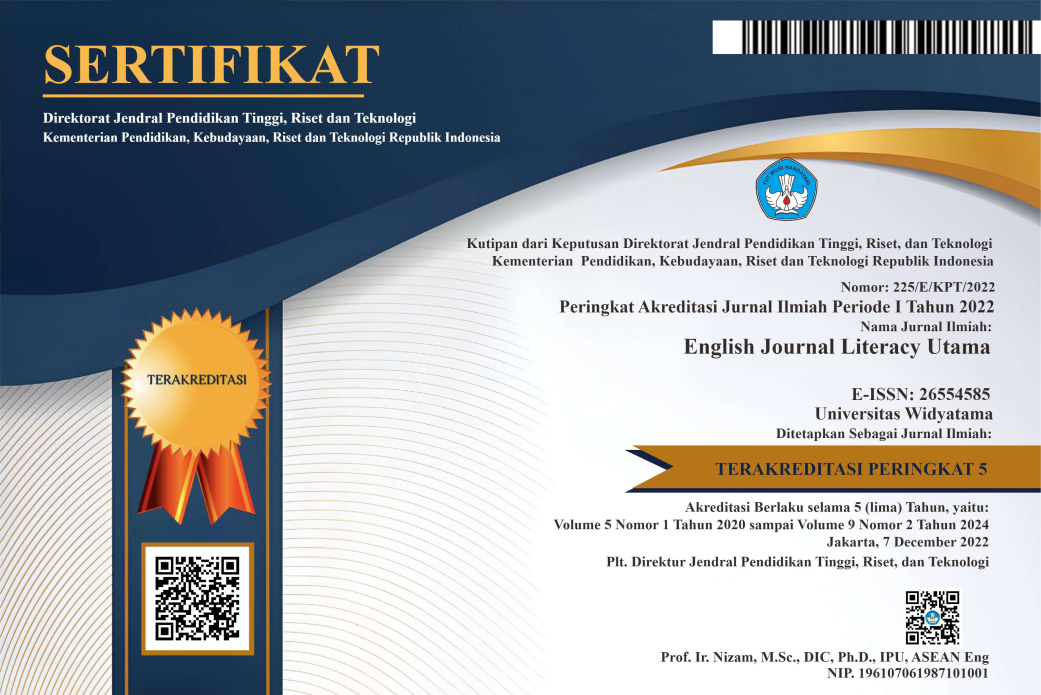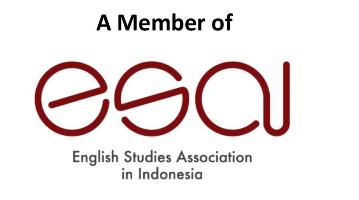ONLINE SPEAKING ASSESSMENT DURING THE COVID PANDEMIC:
Impelementation, Problems, and Strategic Solutions
DOI:
https://doi.org/10.33197/ejlutama.v7i2.196Keywords:
implementation, problems, solution, online speaking assessmentAbstract
Assessment is one of the basic elements of the teaching and learning process. With assessment, teachers can measure students' abilities. Teachers can measure the competencies that students achieve during the teaching process. In this pandemic era, the activity of the teaching process does not apply in the classroom. However, the teaching process can be applied online using technology. The objectives of this study are: (1) For the online voice assessment feature; (2) Investigate the implementation of online assessment of speaking skills in vocational schools; (3) Research the gaps and solutions to overcome the gaps in the implementation of online voice assessment in the pandemic era with 21st century skills. This study uses a qualitative model description to investigate the case design. The researcher collects data through interviews. The interview was conducted with an English teacher who teaches grade 12 of one of the SMKN in Kota Cirebon. The results of this study showed that the implementation of online speaking skills assessment is using WhatApp as a means of communication in the learning and assessment process, and speaking tasks are guided by using video dialogues and video presentations. The problems experienced by teachers in carrying out online speaking assessment are students' ability to think critically and responsibility to perform and fulfil the tasks; the limited media used in the online speaking skills assessment which is just WhatsApp, the kind of speaking task that is not compatible with 21st century skills. Then there are solutions to counter those problems are by teachers motivating students, guiding students in critical thinking and last but not least the role of government in developing and introducing how to use online platforms.
References
Ahmadi, M., R. (2018). The use of technology in language learning: a literature review. International Journal of Research in English Education (IJREE), 3 (2), 115-125.
Alzaid, J. M. (2017). The effect of peer assessment on the evaluation process of students. International Education Studies, 10 (6), 159-173.
Anwas et al., (2020). Social media usage for enhancing English language skill. iJIM, 14 (7), 41-56. https://doi.org/10.3991/ijim.v14i07.11552
Arfah, A. (2020). The use of Kahoot as vocabulary-mediated activity to teach expressions in asking and giving opinion. Thesis. Yogyakarta [ID]: UII.
Asri, A., N. (2019). Designing a 21st century assessment in EFL learning context. International Seminar on Language, Education, and Culture, KnE Social Sciences, pages 335–348. DOI 10.18502/kss.v3i10.3915
Brno. (2006). The role of evaluation in enhancing language competences. Diploma Thesis. 1-140.
Brown, H. D. (2009). Language assessment: principles and classroom practice. San Francisco State University: Longman.
Capacho, D. J. (2017). Assessment of student learning in virtual spaces, using orders of complexity in levels of thinking. Turkish online journal of distance education, 18 (2), 179-201.
Creswell, J. W. (2009). Research design: qualitative, quantitative and mixed method approaches. Los Angeles: SAGE.
Creswell, W. J. (2012). Educational research: Planning, conducting, and evaluating quantitative research. Boston MA: Pearson Education.
Evriana, L. (2020). The implementation of online assessment in English language lesson at 10th grade student of SMA Nasional 3 bahasa putera harapan [Thesis]. Purwokerto (ID). IAIN Purwokerto.
Fahrudin, S., H., Winarni, R., & Winarni. (2020). Analysis of learning speaking skills using the whatsapp application in elementary schools. Journal of Physics: Conference Series, 1-11. Doi: 10.1088/1742-6596/1808/1/012033.
Fraenkel, J.R., Wallen, N.E., & Hyun, H.H. (2012). How to design and evaluate research in education. New York: McGraw-Hill.
Galaczi, E D (2010) Face-to-face and computer-based assessment of speaking: Challenges and opportunities, in Araújo, L (Ed.) Proceedings of the Computer-based Assessment (CBA) of Foreign Language Speaking Skills, Brussels, Belgium, European Union, 29-51
Giatman, M., Siswati, S., & Basri, Y. I., (2020). Online learning quality control in the pandemic Covid-19 era in Indonesia. Journal of Nonformal Education, 6 (2), 168-17.
Hendriyani, M. E., & Novi, R. (2020). Laporan praktikum mandiri dalam bentuk video presentasi untuk mengembangkan kretivitas dan komunikasi lisan di masa pandemi Covid-19. Prosiding Seminar Nasional Pendidikan FKIP, 3 (1), 328-339.
Khairil, L., F., & Mokshein, S., E. (2018). 21st century assessment: online assessment. International Journal Academic Research in Business & Social Sciences, 8 (1), 659-672.
Louma, S. (2009). Assessing speaking. Cambridge: Cambridge University Press.
Meidasari, V. E. (2015). The assessment and evaluation in teaching English as a foreign language. Indonesian EFL Journal, 1 (2), 224-231.
Musfirah, Y. (2019). The use of peer assessment in speaking skill. English educational journal, 10 (1), 67-79.
Namaziandost, E., & Nasri, M. (2019). The impact of social media on EFL learners' speaking skill: a survey study involving EFL teachers and students. Journal of Applied Linguistics and Language Research, 6 (3) 199-215.
Nashruddin, W. & Mustaqimah, H A. Z. (2020). Critical literature review in TEFL research: Towards interdisciplinary study. ELT Echo Journal, 5 (2), 1-5.
Natsir, et al. (2021). Implementing zoom as blended learning platform to obtain learning process from home during the pandemic of covid-19 at Mts 3 enrekang. Exposure Journal, 10 (1), 109-118.
Rahim, A. F. (2020). Guidelines for online assessment in emergency remote teaching during the covid-19 pandemic. Special communication, 12 (2), 59-68.
Purnawarman, P., & Darajati, U. (2020). Authentic speaking assessment applied by English teachers during online learning. Advances in Social Science, Education and Humanities Research, vol. 509. 560-566.
Si’arifah, M. (2019). Teachers’ online assessment in english language education department at Uin sunan ampel Surabaya [Thesis]. Surabaya (ID): Sunan Ampel Surabaya. Starkey, L. (2011). Evaluating learning in the 21st century: a digital age learning matrix. Technology, pedagogy and education, 20 (1), 19-39.
Sugiyarti et al. (2018). Pembelajaran abad 21st di SD. Prosiding Seminar dan Diskusi Nasional Pendidikan Dasar. 439-444.
Swary, D. N. (2014). A study of students' problems in learning speaking English at the second grade of SMP Negeri 1 Talaga [Thesis]. Cirebon (ID): IAIN Cirebon.
Syafiq, N., A. et al. (2021). Increasing speaking skill through YouTube video as English learning material during online learning in pandemic covid-19. Journal of English Language Studies, 3 (1), 50-55.
Torky, S. A. (2006). The Effectiveness of a Task- Based Instruction program in developing the English language speaking skills of secondary stage students. Ain Shams University women's college Curricula and method of teaching department, 1-204.
Tosuncuoglu, I. (2018). Importance of assessment in ELT. Journal of education and training studies, 6 (9), 163-167.
Ulker, V. (2017). The design and use of speaking assessment rubrics. Journal of Education Practice, 8 (32), 135-141.
Wanga, H., Joseph, T., & Chuma, M., B. (2020). Social distancing: role of smartphone during coronavirus (COVID-19) pandemic era. International Journal of Computer Science and Mobile Computing, 9 (5), 181-188.
Weleschuk, A., Dyjur, P., & Kelly, P. (2019). Online assessment in higher education. Taylor Institute for teaching and learning guide series. Calgary: AB: Taylor Institute for Teaching and learning at the University of Calgary. Retrieved from http://tailorinstitute.ucalgary.ca/resources/guides.
Downloads
Published
Issue
Section
License
Copyright (c) 2023 Tedi Rohadi

This work is licensed under a Creative Commons Attribution-NonCommercial-ShareAlike 4.0 International License.
Creative Commons Attribution-ShareAlike 4.0 International License















